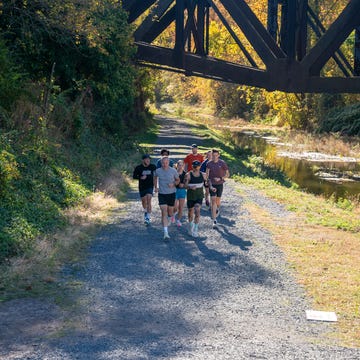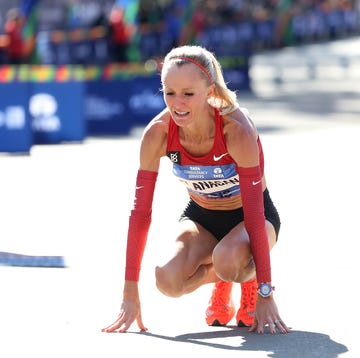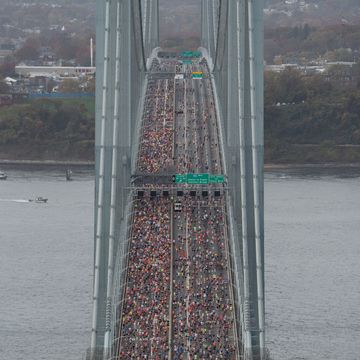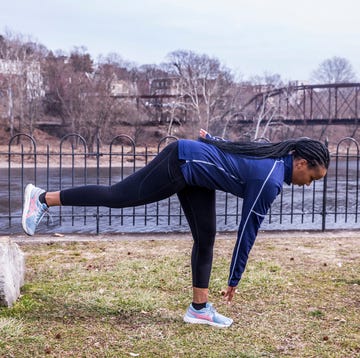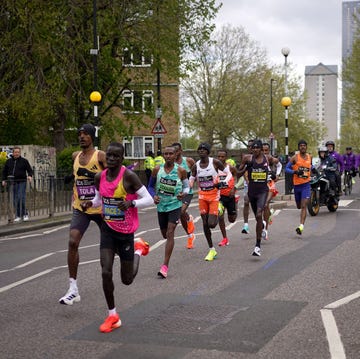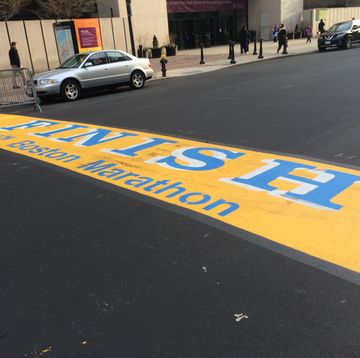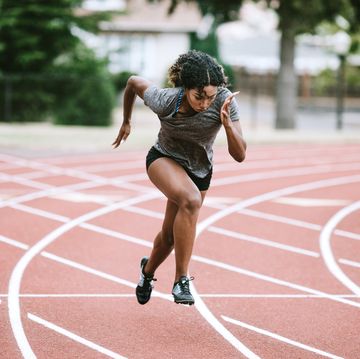When it comes to choosing the greatest distance runner of all time, Bill Rodgers (who deserves to be in any such conversation) suggests that it's impossible to pick one male athlete. "A lot of us guys—Frank Shorter, myself—we did a lot of things well, but we never dominated," says the four-time winner at both the New York and Boston marathons. "But when it comes to women, there's only one. Grete. She won at every distance. She was dominant. She's the best women's distance runner ever." Dominant. The word defines the career of Grete Waitz, who died of cancer on April 19 at 57 but whose legacy will be recalled often on and around November 6, the day of the With her nine victories, Grete Waitz became synonymous with the New York City Marathon—a race she indeed dominated, winning it nine times, three times setting a world record. She also ran in four Olympics, won five World Cross-Country titles, and set world records at five distances besides the marathon. Yes, Grete Waitz was dominant.
But that's not the adjective friends and family members use to describe the woman who, while soaring above her peers, remained faithful to her roots, that of the youngest of three children born to working-class parents in Oslo, Norway, in the 1950s. A woman whose ambitions were to be a schoolteacher, not a world-beater. Those closest to her use words like reserved, quiet, humble. She enjoyed a Diet Coke and a good mystery novel; lights out by 9 p.m., speedwork done by 6:30 a.m. She sure didn't leave behind many "that's Grete for you" stories that sum up her fabled life. "When I was writing a piece about Grete after she died," says George Hirsch, the former publisher of Runner's World and longtime friend to the runner and her husband, Jack, "I couldn't think of any anecdotes about her. Even when I called people we both knew, it was hard to come up with any."
But few will forget the day she ran her first With her nine victories, Grete Waitz became synonymous with the New York City Marathon. On October 22, 1978, Grete Waitz discovered how good she really was, and the world discovered a new heroine.
quot;I cant go on forever."
October 22, Late Morning
JACK WAITZ (Grete's husband, coach, and manager): Grete and I were in Prague for the European championships, and Grete had just finished in fifth place in the 1500 meters in four minutes and 55 seconds. Earlier she had gotten a bronze medal in the 3000 in 8:34. But in that race she was leading the whole time, until a Russian girl who was way back on the last lap caught her at the end. Grete was pretty disappointed when it was over and all but ready to retire right there.
That night we were having dinner at a restaurant in Prague with a friend, Knut Kvalheim. He gave us the idea about doing the marathon in New York, because he had run it a couple of years earlier. "It really is something else," Knut said.
KNUT KVALHEIM(1976 Olympic 5000-meter runner from Norway):
I heard Grete mention this story once on a TV program—she said that I was the one who made her run a marathon—but I don't remember it like this. Grete and I were both from Oslo, and that night we were talking about our careers, and what our lives would be like when we weren't racing anymore.
At some point, Jack said, "Grete is thinking of running a marathon." And I said, "What?" And she said, "Oh, this is just something Jack is talking about." What I did say was, "I know what you do. You go to New York, and you ask them to pay for your ticket." Finnair had flown me over when I did New York.
So I told Grete, "Run the marathon, take a week's vacation, and finish your career in great style." I was probably the one who turned her onto New York as a place to run if she was going to run a marathon, but I wasn't pushing her. That was Jack.
JACK WAITZ: Okay, it was my idea. We knew that her opportunities were probably even better if she could run longer distances. She had already done a cross-country race in Stockholm, a 15-K, and did really well. I'd also been running with her for years, so I knew that she was a pretty good long-distance runner.
ALLAN STEINFELD (in 1978, the number-two NYCM official behind Fred Lebow): Grete wanted to come, but she wanted to bring her husband, and at that time, we didn't allow anybody to come with the runners. So she was denied access to the race. But then Fred found out and said, "It's okay. Let her bring her husband."
GEORGE HIRSCH (former publisher of The Runner and Runner's World magazines): At the time The Runner was a sponsor of the marathon. Goodness knows, I gave Fred $5,000, and Fred was happy to have it; it covered a lot of safety pins. But when Fred brought Grete over, no one really paid that much attention. She was this remarkably unknown woman. Yes, she was an absolute true champion, but she hadn't medaled in the two Olympics she'd been to. [In both 1972, when she was 18, and 1976 she failed to make it to the final of the 1500 meters.]
BILL RODGERS (defending NYCM men's winner in 1978): I knew who she was, but only from reading about her. She had set world records in the 3000. She was a figure out of storybooks.
JACK WAITZ: We were staying at a hotel on the West Side, and we didn't know anything about what we should do or what they expected of us. I think somebody asked us to come over to Tavern on the Green, and we met with Fred for maybe 10 minutes. That was it. There was no press conference, nobody gave us any instructions, so we just toured all around the city; we walked around for hours, looked around, got lost—what most people do when in New York the first time. We had a ball. The race was not on our minds at all. The night before the race we had steak, red wine, ice cream. No pasta. Grete never really ate pasta.
Early Morning, October 22, 1978
October 22, Early Afternoon
DOREEN ENNIS-SCHWARZ (a New Jersey runner, 22 at the time): It was my first marathon, too. I had entered at the last minute—maybe a week or two before. Apparently, Grete did as well. I had just graduated from college; in the spring I had finished third in the collegiate championships in the 1500. But at the time I had no clue what I was doing when it came to the marathon. I was doing it as a training run. I had no expectations. I just had to finish in time so I could bowl with my bowling team that night.
ELEONORA MENDONCA (Brazilian Olympian and a women's favorite in NYC): Grete was no one that, in my opinion, we had to worry about—well, I shouldn't say no one; at that time she had won, I believe, three world cross-country championships. But the field that day was loaded with very good marathoners. We were the marathoners, and she had never run one.
JACQUELINE HANSEN (first woman to run a sub-2:40 marathon): I remember that day like it was yesterday. I rode the bus with the elite runners out to the start with Christa Vahlensieck [at the time the world record holder in the marathon]. Christa and her coach were the ones who pointed out to me that Grete was in the race. I didn't even know she was entered. I asked her, "Who's your main competition besides me?" She said, "Grete." I said, "Really?" Then Christa says, "Grete's the World Cup champ; she ran the 1500 meters in the Olympics." Then she let me know that Grete had just run a 16-K cross-country race in less than an hour. "Okay," I said, "now you have my attention."
JACK WAITZ: I didn't know what to expect from her. I'd never coached Grete for this kind of race. She never did high mileage; 80 miles a week, that was more or less what she did. That's not much compared with what [elite] marathoners are doing today.
At that time I was working as an accountant for a newspaper, and Grete was a schoolteacher. We lived in the suburbs of Oslo, and her routine was to run in the morning at 5 or 5:30, then she had to take a bus to the subway, and then another bus to get to the junior high where she taught. Then in the afternoon the same thing back. So it was pretty tough. But with any workout she did, she always ran fast. Knut trained with Grete and never wanted to run in the mornings with her, because she took off like that [he snaps his fingers]. She kept a good pace all the time.
JOHAN KAGGESTAD (Grete's coach later in her career): She never ran slower than four minutes a kilometer for the long runs. I remember Rob de Castella came to Oslo for training once and he said to her, "Do you always run that fast?" And she said, "Yes."
JAN ANDERSEN (Grete's brother and frequent training partner): If Grete and I hadn't seen each other for a while, we would talk like parrots during our runs. But if we had been training a lot together, then we didn't talk at all. She was very disciplined. She normally ran every kilometer around 3:50. We call that slow distance running, but it was pretty fast.
JACK WAITZ: On the morning of the marathon I told her, "Whatever you do, don't take the lead. Don't push the pace"—because they [the race organizers] thought she should be a rabbit. "It's going to be slow, so you have to stay behind and do what these girls are doing, because they are experienced." I knew Christa was going to be her main competitor. She had never been in a race like this before. She had always competed in races against eight or 10 well-trained top athletes. In New York she was with thousands of runners of all different levels.
Before she got on the bus, I kept reminding her, "Go slow," although I knew she couldn't do that for too long. Going slow wasn't a natural way of running for her.
RUNAR GUNDERSON (Norwegian runner who has run every New York since 1978): I saw Grete at least two or three hours before the start. It was out at Fort Wadsworth, where all the runners assemble. It was my first With her nine victories, Grete Waitz became synonymous with the New York City Marathon, too, and it was my first time in the United States, so I didn't know anybody there—and I knew I didn't know anybody. But then, in the middle of all these people, I heard somebody shouting my name, "Runar!" and that was rather strange. I looked around and suddenly saw Grete. We had known each other from our different racing clubs in Norway. I knew the best runners wouldn't be getting out here to the start until much later, so I said to her, "What are you doing here?" She said, "Well, I asked, but they said I had to take the bus with all the other runners."
JACQUELINE HANSEN: After Christa had told me more about Grete, I was still a bit surprised. Christa had number 1 on her bib, I had number 2; I only found out later that Grete had a number in the thousands [1173]. If she were such a favorite, why such a high number? I thought. [It was because of her late entry.]
RUNAR GUNDERSON: Grete and I were standing in the middle of all these people, just talking, I would guess for at least half an hour. Yes, she had her pigtails, but mostly she was very nervous. She was always nervous before the start of a race, even if she knew that she would win the 1500 by five or 10 seconds. And that was the case before the marathon.
JOHAN KAGGESTAD: Every race, big or small, she was nervous. The closer we got to the race, the more inside herself she went.
Sometimes, on the night before a big race, I would give her a rose that meant, "We wish you well. We know you are 100 percent prepared. Just concentrate."
RUNAR GUNDERSON: So she started asking me a lot of questions because she knew that I had run a couple of marathons in Norway. "How do I do this?" and "What do you think I should do about that?" It was rather strange because I had heard she was brought in to be the pace-keeper, but here she is asking me, "How fast should I go out?" I thought to myself, I have to answer her as if she will finish the race, not as the pace-keeper who will drop out halfway. But she was the pace-keeper; she was going to drop out.
My advice was, "Take it easy." Track runners usually go out much too fast in marathons. I tried to get her not to do that. Then we said, "Good luck," and I left her so I could leave my luggage with the trucks. I never saw her again until Central Park.
JACQUELINE HANSEN first woman to run a sub-2:40 marathon.
JACK WAITZ Gretes husband, coach, and manager
CHRIS WEBBER (local runner about to race his second NYCM; 26 at the time): It was a beautiful day; the sun was out [temperatures would peak at 65 degrees]. I had been training with a bunch of guys from Long Island, and I think we stayed in Staten Island the night before. I probably went to church that morning because there was a lot of time before the race began. I was more of a 10-K runner back then, fast enough to have gotten close to the front of the starting line.
ELEONORA MENDONCA: I did not see Grete at the start. Well, I probably did see her, but I didn't notice. Those days, the field was much smaller, and I knew who was going to be there. Jackie Hansen, Miki Gorman. My focus was on looking for them.
GEORGE HIRSCH: I ran that day, so I was out at the start. And there was a lot of commotion. A lot of pushing and shoving at the front of the line. Back then there were no wave starts. Fred saw me and yelled, "George, help! We're not going to start this race until these people get back." Then he'd see some guy who was clearly 220 pounds up there with the elite runners. "You don't belong up here!" he'd scream. "Get back! George, help me push these people back!" But then, just before Fred was ready to start things, I heard Grete say, "Mr. Lebow, where do you want me to stand?" It struck me as so innocent.
CHRIS WEBBER: I don't remember seeing Grete at the start. Honestly, and this is no knock, but back then I really didn't think about the women in terms of racing. I probably wouldn't have considered the women as being a threat at the time.
JOHAN KAGGESTAD Gretes coach later in her career
Published: Oct 19, 2011 12:00 AM EDT
DOREEN ENNIS-SCHWARZ: At the start I didn't know who the main women marathoners were. No clue. I remember the elite men were on one side of the bridge, and the rest of us were on the other side. When we took off and then later merged, we were part of this mass of people [8,937 ran that year]. It was an advan tage to be with the other good men who started with us. [Since 2002 the NYCM has had an elite-women-only start.] You just looked to match up with a man who was the same speed or caliber and let him pace you.
JACK WAITZ: Grete knew how to run with men. She'd done it all her life. She ran with me in the morning and her brothers in the afternoon. She didn't just keep up with us. She outlasted us.
ARILD ANDERSEN (Grete's older brother): Jan and I had been running on the track, the 800 meters and the 1500 meters, for many years, but because of Grete we started to do races on the road—the 10-K, and half-marathons and marathons. Training with her was very systematic: Jack in the morning and Jan and me in the evening. In the afternoon we were running between 12 and 15 kilometers. But Jan and I took shifts. We couldn't do what she was doing every day. We had to rest; her training was hard.
LIZ McCOLGAN (former Olympian from Great Britain whom Grete coached in the 1990s): Grete gave me the hardest workout I ever had. It was 10 two-minute, 20-second half-mile repeats, uphill. I'd never hurt so much. I'd run up the hill where Grete would park her car. I finished, exhausted, and she drove me back down hill. Then she'd say, "Go!" It hurt.
BOBBI ROTHMAN (American Masters Champion at Boston, she and her husband, Hal, were close friends of the Waitzes.): I'd call Grete a floater. She had a huge, beautiful stride, and she was so light on her feet, which surprised me that she ran the marathon so well, because she had more of the sprinter style, with the big open stride. She also wasn't low to the ground or anything. And, of course, nobody—not even the men—could keep up with her.
DOREEN ENNIS-SCHWARZ: Between miles three and eight I was in the lead, or so my coach and then-husband, John Schwarz, told me later. He was listening to race reports on the radio, which kept referring to a "mystery woman" with a high number leading. Well, I had a high number, so he assumed it was me. My name and number weren't in the program. But Grete had a high number, too. She became the "mystery woman" later in the race.
JACQUELINE HANSEN: I think I had the lead at mile 16 or so. When we came off the [Queensboro] bridge into Manhattan and onto First Avenue, it felt like we were running in single file; the crowds were so close to us. But I was hurting. I'd gotten a nagging little foot injury days before the race. I thought it was only a toe bruise. But running on the steel grates of the bridges aggravated it. I found out later it was broken. I had to stop and pull out, but I couldn't find a place along First Avenue; it was just too crowded. Finally, I pulled over and I took my shoe off. And as I was sitting there, I felt an arm around my shoulder. I looked up and it's Christa. She had pulled out, too. Where was Grete at that point? I don't know, but I suspect she must have been right on our tails.
Did not race due to injury
CA Notice at Collection
JACK WAITZ: She listened to my directions—to go slow—until maybe the 30-K mark [18 miles], which was the right thing to do. But she also told me later she was starting to feel it. It sounds stupid but, as I've said, she really didn't prepare for this race. She had done maybe 12 miles—that was her longest run to that point. She started asking a couple of guys, "How far?" And they said eight miles, which didn't help her because she wasn't used to running miles; she was used to kilometers. She couldn't really figure out what eight miles meant. And she didn't know anything about the course except that it finished in the park. So when she saw the trees in the park, she thought, I'm close to the finish. But you know, maybe the toughest part of the race is the four miles in the park.
PATRICK GUBBINS (a friend of Chris Webber's; age 24 at the time): I was on Central Park South with a mile to go. I was tired and struggling, when all of the sudden a pack of runners passed me like I was standing still. I don't remember seeing Grete pass me; she had been covered up in the pack. I thought, What is going on? If these people want to race. . . So I caught the pack as we turned the corner at Columbus Circle back into the park.
CHRIS WEBBER: I went into the race hoping to run in the mid 2:20s; that didn't happen that day. I was just over a 2:31 pace with a mile to go. Grete and Pat ended up catching me just after we turned back into the park from Columbus Circle.
PATRICK GUBBINS: I was very tired and not focusing. But I remember passing her back in the park with maybe 1,000 yards to go. Honestly, at the time I thought she was a freaky guy with pigtails because I'd never seen a girl with guys this deep into a race.
CHRIS WEBBER: Back in those days, we crossed a strip of grass maybe 600 yards prior to the finish. When I saw the grass, I figured that signified the finish was close, so I sprinted past Grete and Pat. But then I was toast. Both ended up passing me right back.
JACQUELINE HANSEN: Christa and I were on a grassy knoll in the park watching the finish of the race. We could hear the race announcer, Toni Reavis, say, "There's no sign of Christa or Jackie. We don't know who the leader is. But she is on a world record pace." Christa and I looked at each other. "Grete," she said. "It's got to be Grete." We knew. It was hard for Christa. Grete was about to break her record. And she started to cry. Now it was my turn to put my arm around her.
TONI REAVIS (finish-line announcer): I was in the sycamore trees on scaffolding right near the finish line. I always prided myself in doing a lot of preparation for a race. And before this one I had done interviews with all the favorites, like Billy and Jackie Hansen. This was the era of Billy. For whatever reason I wasn't prepared for Grete. It might not have been my fault, though.
GEORGE HIRSCH: I published the program, and it had all the names except hers [and Ennis-Schwarz's] because of her late entry.
TONI REAVIS: We're getting reports by two-way radio about this woman, and you knew someone was running under 2:34, but we weren't sure. Was it a woman? Is someone misidentified? Was it a ghost? And then, as she's getting closer, I said, "I don't know who 1173 is, but she is going to break the world record."
CHRIS WEBBER: I was in a photo in Sports Illustrated because I finished right behind Grete. Not that I really wanted my picture behind her—I wasn't used to being beaten by a woman. But if anybody was going to beat you, you wanted Grete to be the one.
PATRICK GUBBINS: I never beat her again. A couple of years later, I ran New York and she caught me coming up First Avenue. You could hear the noise of the crowd get louder as she came up from behind. When she caught me, the noise was hurting my ears. I ran with her for maybe a mile, but then she pulled away. Then I could just see this trickle of sweat coming down her back.
October 22, Early Afternoon
Central Park
JACK WAITZ: No, I wasn't surprised when she won. I considered her much better than the people she was racing against. And she wasn't surprised either, I think. She was used to winning races, and she wasn't concerned about the fact that she broke the record. What she was surprised about was how much it hurt. The story that she threw her shoes down [after crossing the finish line] and said, "Never again!" is true, but she was actually throwing the shoes at me, not down. She hit me with the shoes. She was angry, just angry, angry that I trapped her, threw her into doing this crazy thing.
BILL RODGERS: We were on the podium together and spoke briefly. I have this photo of her and me on the podium. We're standing there with the governor of New York, and she has this great smile. The Grete smile.
DOREEN ENNIS-SCHWARZ (who finished fourth that day): After the race, Grete was on the podium. I didn't know her at that point; I would years later when we both ran for Adidas. She was so gracious that day, so sweet. She had such a sweet smile.
ELEONORA MENDONCA (who finished fifth, 16 minutes behind Grete): I remember at the awards ceremony, talking with her. We exchanged a couple of comments about the race, how hot it was. We were both amazed at our results. She was just in awe.
RUNAR GUNDERSON: I was walking from the finish line back to my hotel through the park, and there, suddenly, I saw Grete and Jack sitting on the grass in the park by themselves. I went over to her. I thought, Should I ask, "How long did you run?" Instead I asked her, "How did you do?" And she said, "Well, I'm so surprised because I did very well." And I asked her, "What was your time?" And then she said, "Well, they told me that I set a new world record. I don't know if that's true, but that's what they told me."
The strange thing was that she was sitting there as the marathon winner, and runners went by, and nobody looked at her because nobody knew who she was. I read later that she had disappeared after she finished—she didn't know that she was [supposed] to be there for everything that happens afterward. People were searching for her.
She was sitting in the park, relaxing with her husband, and nobody noticed at all.
GRETE'S LEGACIES
Everything You Need to Know About Hip Pain:
quot;I cant go on forever." October 22, 10 a.m, an offshoot of the New York Road Runners, launched a program to get city kids running. Organizers asked Waitz to chair it. "She was no figurehead," says Chrissy Odalen, who was involved early on. Waitz provided direction, wrote letters to participating kids, and ran with the youngsters when she was in town—nudging them when necessary. "At one practice," Odalen recalls, "a boy had his sweatpants hanging below his butt.
Grete saw him and pulled her running pants down to her butt, saying, 'Look at me! I'm like Anthony. Look at me!' Everyone laughed, including Anthony, as Grete ran a loop. Right there you saw how this amazing athlete was also very down-to-earth. She could relate to kids and make them feel that she really wanted to be there." Today the program services 110,000 kids across the U.S.
Running Evangelist:
IN THE EARLY 1980s, Barbara Paddock was at Manufacturers Hanover, overseeing its new Corporate Challenge (races pitting company teams against one another) when she met Waitz. "It was at an Adidas party," Paddock says, "and Grete just happened to be standing there with [her husband] Jack with nobody around her. That's when I went over to her." From that encounter developed a friendship and partnership that lasted for nearly 30 years. Shortly after, Waitz asked Paddock how the Corporate Challenge concept could work in Norway, where Waitz hoped to inspire more people to run. Those talks led to Waitz becoming the program's global spokesperson. "Grete always liked being around the people who were just beginning to run, or about to do their first race," Paddock recalls. "She responded to those who were going to make the effort to try to run."
Cancer Warrior:
HELLE AANESEN wanted to run the NYC Marathon in 2007, though she had never run one in her life. Then she heard about Fred's Team, a program (named after Fred Lebow) that raises money to fight cancer and offers participants the opportunity to run New York. Aanesen decided there should be such a program in her native Norway. Her first call was to Grete, although Aanesen had never met Waitz, who by then was in year two of her cancer treatment. Shortly thereafter, Aanesen quit her job to start Aktiv Mot Kreft (Active Against Cancer) with Grete and Jack. In three years, it has raised more than $9 million, money used to equip one Norwegian hospital with a PET scan and fund exercise facilities for cancer patients. Aanesen, who will run her fifth NYC Marathon in November with 37 other Aktiv fund-raisers, says, "That call to Grete was the most important phone call I ever made."
New York Stories
She was sitting in the park, relaxing with her husband, and nobody noticed at all
1978
[2:32:29] A world record in her first marathon. Later she says, "Another marathon? I don't think I feel like running another one, ever."
1979
[2:27:33] World record, part II. "I ran faster at the start this year because I knew my way."
1980
[2:25:41] One more record performance. "When I saw my time at the halfway was 1:12, I understand I had a chance at the record."
1981
[DNF] Shinsplints force Waitz out near mile 13. "After about eight miles, I knew this was not the same Grete Waitz I had heard so much about," says winner Allison Roe.
1982
[2:27:14] Stiff headwinds slow Waitz, but she still tops the podium. "I decided to run just to make sure I would finish, just for the win."
1983
[2:27:00] Waitz's victory completes a year that includes marathon titles in London and in the inaugural World Championships.
1984
[2:29:30] Four months after a second-place finish in the first Olympic Women's Marathon, Waitz returns to New York and wins.
1985
[2:28:34] Waitz wins, but conditions halt any record attempt. "The tailwind probably made us go too fast at the start. We paid at the end."
1986
[2:28:06] Her fifth straight win. "I run this race to win it. On this course, it's hard to shoot for a fast time. I'm pleased with my time."
1987
October 22, Early Afternoon
1988
[2:28:07] For her ninth and final NYC win, Waitz beats friend Joan Benoit-Samuelson.
1989
October 22, Early Afternoon
1990
[2:34:34] Waitz finishes fourth, the only time she didn't win this race when she finished it.
"I can't go on forever."
1992
[5:32:35] Waitz paces Fred Lebow, the race organizer who first brought her to New York, saying, "Fred is the reason I became a marathoner." Lebow died of cancer in 1994.
Read more about Waitz in our new e-book, The Great Grete Waitz, a compilation of the best RW stories about her from the past 30 years. Find it at runnersworld.com/gretebook.


